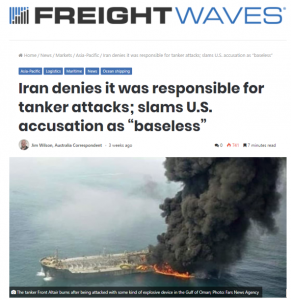Opinion Leader in maritime security
by Jenifer Hasbun
 CPA Group Executive Chairman, Harley Sparke is regarded as one of the foremost experts in the maritime security industry, having participated in government committees and reviews regarding maritime security legislation. He is a sought after speaker at related conferences and is frequently interviewed, both formally and in background briefings by industry and general media organisations.
CPA Group Executive Chairman, Harley Sparke is regarded as one of the foremost experts in the maritime security industry, having participated in government committees and reviews regarding maritime security legislation. He is a sought after speaker at related conferences and is frequently interviewed, both formally and in background briefings by industry and general media organisations.
A recent example involved the on-line publication FreightWaves, June 2019 edition.
FreightWaves – “#1 Source For Navigating The Freight Markets” – sought out Harley after the recent attacks on oil tankers in the Gulf of Oman.
Excerpts from the article are below:
FreightWaves also spoke to Harley Sparke, executive chairman of Corporate Protection Australia Group. Sparke is a specialist in maritime security. He previously advised maritime box terminal operators on waterfront security during a long-running, country-wide strike by Australian longshoremen. He has also advised the U.S. Navy on visits to Australia and the U.S. Coast Guard on port security around the world.
Guns aboard ships?
Sparke commented on the use of shooters to defend ships – the maritime industry now has experience of such matters following the Somali piracy boom in the years 2007 to 2009.
“There’s a huge amount of debate. There are pros and cons with armed ships. There have been instances of mistaken attacks on fishing vessels,” he said.
“And then there’s the issue of the legality of firearms when ships enter territorial waters,” Sparke says. Under the international law of the sea, the law aboard a ship on the high seas is the law of the country where the ship is registered. Firearms may therefore be perfectly legal aboard a ship sailing on international waters. However, when the ship enters the waters of another country, the law of that nation will apply. And the law of that other country may not allow firearms aboard ships.
“There’s a lot of debate and arm-wrestling over what is right and wrong,” Sparke says on the subject of firearms aboard ship.
He also pointed to the difficulties of defending ships against divers, arguing that they are “unlikely” to be seen, especially during low-light situations. However, he pointed out, the best defense against an explosive device attached to a ship is to deploy a friendly diver to find and remove it.
Torpedo attack is unlikely
Sparke also thought that a torpedo attack on the two tankers is unlikely.
“I would be gobsmacked if there was a torpedo attack. It would take such sophistication and infrastructure resources for a non-national actor and it would be unlikely the Iranians would be that brazen. I’m more of the view that it was either a limpet mine or an IED (improvised explosive device),” he said.
Sparke said that the attack, given what little is actually known, was sophisticated. He pointed out that, in the region, especially in Yemen, which is in the middle of a civil war, “explosives are piled up everywhere.” Those factors make it possible for actors who are of a mind to do so to carry out an attack.
“There’s likely to be a third-party supplying equipment,” Sparke said.
Ultimately, he agreed with the first maritime security expert in that is is very hard for commercial ships to defend against sophisticated attacks.
“The greatest security risks to commercial shipping is an attack on the ship itself. It’s easy enough to secure a port. But the ability of law enforcement, the military or merchant shipping to defend against such an attack is limited. There’s little hope of merchant ships being able to defend themselves,” he said.